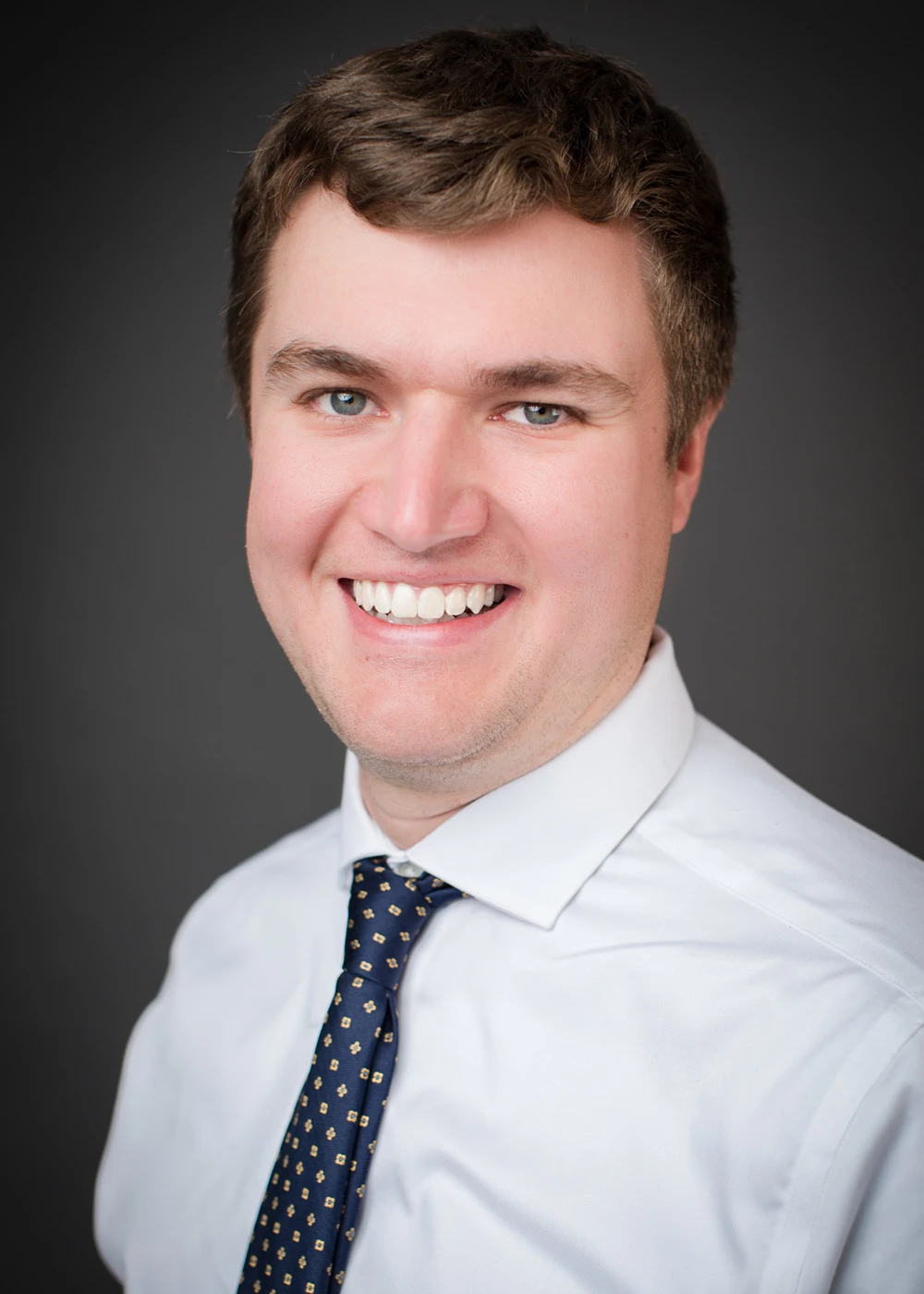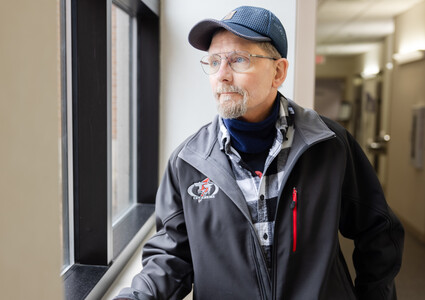





Cancer Care
Expanded cancer care services in Fremont give patients convenient options
Published: April 5, 2024
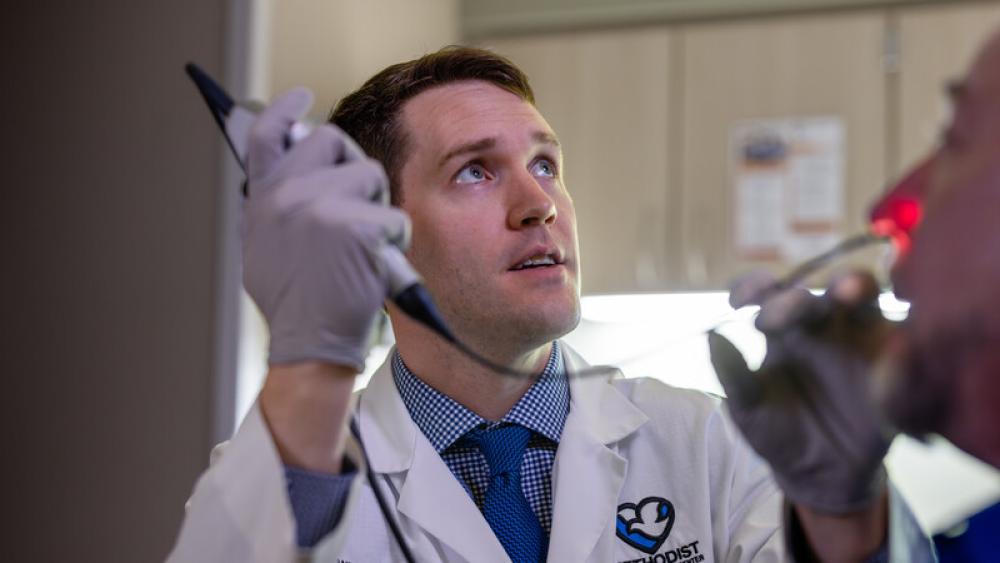
Scott Doty, a neck and lung cancer survivor, has filled his schedule with checkups and treatments over the past three years. In that time, he’s become quite familiar with the drive from his Fremont home to the Methodist Hospital and Methodist Estabrook Cancer Center (MECC) campus.
But thanks to Methodist Health System’s enhanced outreach for head and neck oncology and radiation oncology, Doty no longer needs to leave his hometown for all of his appointments.
“Not only do you have options, but it’s a huge convenience factor to be able to receive care locally,” Doty said.

Meeting patients where they are
Since October, Methodist head and neck surgical oncologists Andrew Holcomb, MD, and Aru Panwar, MD, have been making weekly trips to Methodist Fremont Health to see patients.
One of the goals of extending into the Fremont community is to reach patients who have obstacles getting to Omaha and may seek treatment elsewhere.
“For uncommon medical problems, you want to be treated by medical professionals who have the highest level of expertise and consistent experience,” Dr. Holcomb said. “We don’t want people having to choose between staying in their community and being treated at a high-volume center with the highest level of resources.”
Head and neck cancer patients are able to receive many services at Methodist Fremont Health, including:
- New-patient consultations
- Follow-up appointments
- Biopsies
- Imaging
- Flexible laryngoscopies
- Some surgeries
Specialized surgeries and treatments can only be completed at Methodist Hospital, but the majority of a patient’s needs can be met in Fremont.
Dr. Holcomb and Dr. Panwar were seeing just a handful of patients during the first month of traveling to Methodist Fremont Health, but they soon had a full clinical schedule. That’s in large part because the Head and Neck Cancer Clinic staff has started asking existing patients from Fremont and other locations north and west of Omaha if they’d like to be seen closer to home. In most cases, the transition is seamless. Drs. Holcomb and Panwar have even taken on some patients who previously received care from one of Methodist’s other five head and neck surgical oncologists.
For throat cancer survivor Jimmie Mayo and his wife, Shelly, who live near Valparaiso, Nebraska, about 20 miles north of Lincoln, the drive to Fremont is easier than driving to Omaha.
“The distance isn’t a whole lot different. It’s just that I don’t always like to drive in bigger cities,” Shelly Mayo said. “So the drive to Omaha and back is almost as panicky as going to a cancer doctor and trying to wait to hear what the results are. It’s just nerve-wracking, so going to Fremont is so nice for us.”
Dr. Holcomb and Dr. Panwar have also received more referrals from primary care providers and ENTs in Fremont.
“People have been grateful for us being in that community,” Dr. Holcomb said. “And we’re certainly happy to be there.”
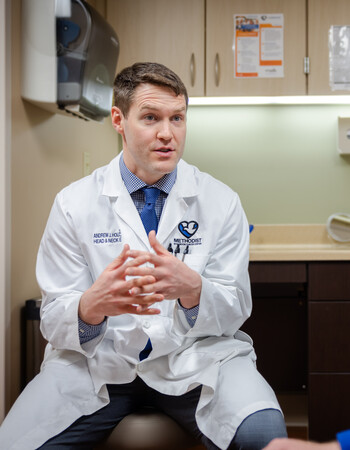
All seven of Methodist’s head and neck surgical oncologists who see patients at MECC spend at least one day a week in clinic at either Methodist Fremont Health, Methodist Jennie Edmundson Hospital or Children’s Nebraska.
“It allows patients to have the same resources, regardless of where they first meet us,” Dr. Holcomb said. “We have a standard of care that we expect for our patients. That is independent from the location where they’re seen.”
Enhancing outcomes
Providing patients with options of where to receive their care can enhance overall outcomes.
“Patients have to make decisions about cancer care, and medical care in general, in the context of the rest of their life,” Dr. Holcomb said.
One way that Methodist Health System helps ensure it’s offering every cancer patient the best possible care is through its use of multidisciplinary tumor boards. At these regular meetings, each patient case is reviewed by a team consisting of surgeons, medical oncologists, radiation oncologists, radiologists and cancer care coordinators. The conferences are also attended by ancillary services such as research, social work and nutrition services, which play vital roles in equipping patients with necessary resources.
“At the end of the day, cancer care isn’t just about radiation care. It’s not just about surgery. It’s not just about chemo,” said Methodist radiation oncologist Ming-yang Hung, MD. “It all has to come together.”
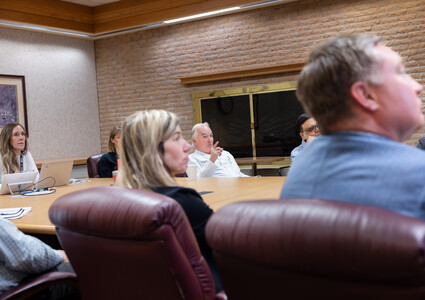
Continuity of care
Cancer patients have had the opportunity to receive radiation oncology services at the Methodist Fremont Health cancer center for many years, but it wasn’t until last summer that radiation oncologists Tien-Shew (Bill) Huang, MD and Dr. Hung started booking appointments in Fremont.
Dr. Huang and Dr. Hung are able to see patients during each stage of their cancer journeys.
“Patients get the continuum of care,” Dr. Hung said. “Not only for the initial consult or the treatment, but, more importantly, the follow-up.”
Dr. Hung believes follow-up appointments with the same provider are essential to making sure changes are detected early.

Fremont’s cancer center is also covered by the same physicists and dosimetrists who provide services at MECC and Jennie Edmundson Hospital. This helps ensure that quality control and safety is consistent across the health system.
“It’s more than just having our team of physicians going there,” Dr. Huang said. “It’s also our physicists and dosimetrists — and that’s really important for quality assurance.”
“Using the same platforms and same protocols creates a unified approach to care,” said Alex Siebels, BSRT (R)(T), manager of radiation oncology at Methodist Fremont Health.
Patients who receive radiation treatment typically need multiple rounds of treatment on consecutive days, which can create burdens for patients who travel 30 or more minutes for appointments, especially when a single treatment may take 10-15 minutes to complete.
Doty received 15 radiation treatments at MECC last summer and didn’t have any issues making the drive to Omaha. But in January, he needed an additional week of treatment. With challenging winter driving conditions, Doty chose to receive his care in Fremont.
“With being able to do it right here in town, I didn’t have to miss anything,” he said. “It made a world of difference to receive the treatment here locally.”
Siebels said decreasing the stress of travel allows patients to focus on more important things.
“We want to make sure patients are as comfortable as possible and spend time recovering, not driving,” Siebels said.
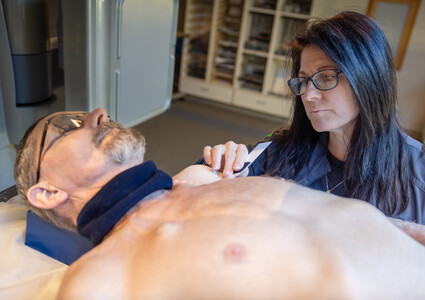
As part of enhancing patient experiences in Fremont, Fremont Health Foundation launched a cancer capital campaign in 2022 to purchase a new linear accelerator.
The hospital’s current linear accelerator has been in use since 2003. The new equipment would provide patients with more efficient appointments, and more patients could be seen each day.
“I firmly believe that this is an opportunity for us to see growth and to serve the needs of cancer patients locally,” said Shawn Shanahan, executive director of the Foundation.
Thanks to the campaign, the new linear accelerator is on track to be installed in late 2024.
For patients like Doty, it’s important to have the resources available in Fremont – including providers and equipment – so they have the option to receive care close to home.
“It saves time,” Doty said. “It saves money for gas. I’m just happy they’re able to start coming here.”
“The best part of going to Fremont is that patients are so appreciative when we’re able to deliver the same quality of care closer to where they live,” Dr. Huang said.

